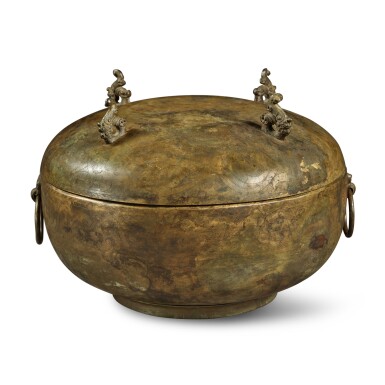Important Chinese Art
Important Chinese Art

Important Chinese Art from the Collection of Bruce Dayton and Ruth Stricker Dayton
A bronze vessel and cover (Dui), Eastern Zhou dynasty, Warring States period | 東周 戰國 銅龍紋敦
Auction Closed
September 22, 04:06 PM GMT
Estimate
10,000 - 15,000 USD
Lot Details
Description
A bronze vessel and cover (Dui)
Eastern Zhou dynasty, Warring States period
東周 戰國 銅龍紋敦
the deep sides resting on a short straight foot and set with a pair of beast-mask handles each suspending a loose ring, surmounted by a domed cover with four dragon-form finials that serve as legs when the lid is turned over, decorated overall with bands of stylized interlocking dragon heads and hooked scrolls reserved against a striated ground, all bordered by bands of double helix, patinated to a mottled golden brown (2)
Diameter 9¾ in., 24.7 cm
J.J. Lally & Co., New York, 20th February 1999.
來源
藍理捷,紐約,1999年2月20日
Compare a vessel of similar form inlaid with silver and turquoise and decorated with confronting bird motifs, included in the exhibition Chinese Art of the Warring States Period: Change and Continuity, 480-222 B.C., Freer Gallery of Art, Washington D.C., 1982, cat. no. 9, where a related silver-inlaid bronze vessel, excavated in 1965 from Tomb 2 at Wang Shan, Hubei province, is discussed. Another vessel with confronting birds is illustrated in Jenny So, Eastern Zhou Ritual Bronzes from the Arthur M. Sackler Collections, Washington, D.C., 1995, pl. 85. See also a dui with splayed feet and set with pair of loop handles on the cover and bowl, formerly in the J. T. Tai & Co. Collection and sold in these rooms, 22nd March 2011, lot 185.
The engraved motifs on the present vessel bear strong similarities to contemporaneous lacquerware designs. For example, compare the bird and dragon scroll found on the side of a lacquered se excavated from Tomb no. 1 of Marquis Yi of Zeng in Suizhou, Hubei, now preserved in the Hubei Provincial Museum, Wuhan.
